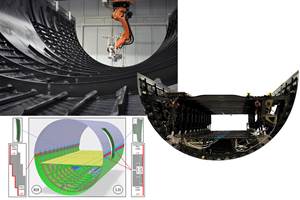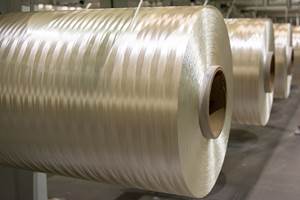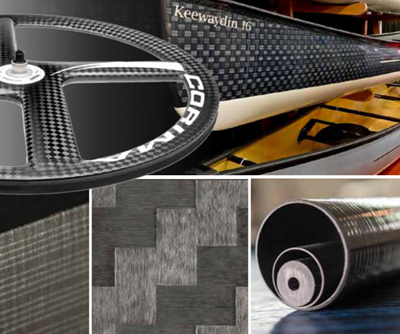Textile machinery, NCFs provide sustainable processing options
CAMX 2024: Karl Mayer is returning to CAMX with a focus on fabric- and fiber-handling equipment, in addition to its application development services.
Share
After a brief hiatus, noncrimp fabric (NCF) production specialist Karl Mayer North America (Greensboro, N.C., U.S.) is returning to CAMX. The Karl Mayer Group (Obertshausen, Germany) subsidiary is presenting itself as an innovative composites partner with the display of high-performance machines such as the Cop Max 4, a flexible all-rounder made to produce multilayer, multiaxial fabric structures; the Cop Max 5, specifically for processing carbon fibers; and the UD 700 fiber spreading system. Furthermore, the company is highlighting a new machine that was launched this past spring, called Max Glass Eco, for highly productive manufacturing of standard applications made exclusively from glass fiber.
Overall, the focus of the company’s medial presentation — the various medias on display at the booth — focus on the processing of natural fibers into sustainable composite reinforcements, from videos to final products made from natural fibers, as well as a sample collection. For instance, in cooperation with winter sports industry representatives, Karl Mayer has processed hemp tapes and flax fibers into NCFs for snowboards and skis using the Cop Max 4, which were launched at JEC World 2024 and Techtextil visitors.
“The global composites industry is under enormous pressure to reduce its ecological footprint,” says Lutz Heinig, sales manager technical textiles, Karl Mayer North America. “Our NCFs made from natural fibers can make an important contribution to this.”
Related Content
-
Manufacturing the MFFD thermoplastic composite fuselage
Demonstrator’s upper, lower shells and assembly prove materials and new processes for lighter, cheaper and more sustainable high-rate future aircraft.
-
Bio-based acrylonitrile for carbon fiber manufacture
The quest for a sustainable source of acrylonitrile for carbon fiber manufacture has made the leap from the lab to the market.
-
Natural fiber composites: Growing to fit sustainability needs
Led by global and industry-wide sustainability goals, commercial interest in flax and hemp fiber-reinforced composites grows into higher-performance, higher-volume applications.
Related Content
Manufacturing the MFFD thermoplastic composite fuselage
Demonstrator’s upper, lower shells and assembly prove materials and new processes for lighter, cheaper and more sustainable high-rate future aircraft.
Read MoreBio-based acrylonitrile for carbon fiber manufacture
The quest for a sustainable source of acrylonitrile for carbon fiber manufacture has made the leap from the lab to the market.
Read MoreNatural fiber composites: Growing to fit sustainability needs
Led by global and industry-wide sustainability goals, commercial interest in flax and hemp fiber-reinforced composites grows into higher-performance, higher-volume applications.
Read MorePlant tour: Teijin Carbon America Inc., Greenwood, S.C., U.S.
In 2018, Teijin broke ground on a facility that is reportedly the largest capacity carbon fiber line currently in existence. The line has been fully functional for nearly two years and has plenty of room for expansion.
Read MoreRead Next
The spread of spread tow
Advancing from “lighter and thinner” to boosting strength, stiffness, impact resistance and productivity, spread tow unlocks new applications and markets.
Read MoreHealable thermoset resin achieves ultra-fast composites repair
CAMX 2024: CompPair HealTech solutions give the ability to heal cracks and delaminations in a composite via local heating more than 60 times, available for a range of composite processes.
Read More“Structured air” TPS safeguards composite structures
Powered by an 85% air/15% pure polyimide aerogel, Blueshift’s novel material system protects structures during transient thermal events from -200°C to beyond 2400°C for rockets, battery boxes and more.
Read More










